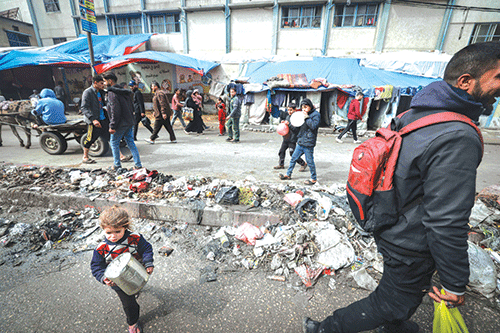THE HAGUE – Israel is applying an even more extreme version of apartheid in the Palestinian territories than experienced in South Africa before 1994, Pretoria told the world’s top court on Tuesday.
“We as South Africans sense, see, hear and feel to our core the inhumane discriminatory policies and practices of the Israeli regime as an even more extreme form of the apartheid that was institutionalised against black people in my country,” said Vusimuzi Madonsela, South Africa’s ambassador to the Netherlands, where the International Court of Justice (ICJ) is based.
An unprecedented 52 countries are taking the stand at the ICJ, which has been asked to provide a non-binding “advisory opinion” on the legal implications of Israel’s occupation of Palestinian territories.
“It is clear that Israel’s illegal occupation is also being administered in breach of the crime of apartheid… It is indistinguishable from settler colonialism. Israel’s apartheid must end,” said Madonsela. He said South Africa had a “special obligation” to call out apartheid wherever it occurs and ensure it is “brought to an immediate end”.
The case is separate from a high-profile case brought by Pretoria against Israel for alleged genocide during its current offensive in Gaza. In that case, the ICJ ruled that Israel should do everything in its power to prevent genocidal acts in Gaza and allow in humanitarian aid.
The hearings kicked off on Monday with three hours of testimony from Palestinian officials, who accused the Israeli occupiers of running a system of “colonialism and apartheid”.
Palestinian Foreign Minister Riyad Al-Maliki urged the judges to call for an end to the occupation “immediately, totally and unconditionally”. The ICJ rules in disputes between states. However, it can also be asked to provide a legal opinion on a topic of international law.
The United Nations asked it in December 2022 to provide guidance on the “legal consequences arising from the policies and practices of Israel in the Occupied Palestinian Territory, including East Jerusalem”.
When the ICJ rules in contentious cases between states, its judgement is binding but it has little means of enforcement. It ordered Russia to stop its invasion of Ukraine, for example.
In contrast, an advisory opinion is completely non-binding but would likely add to the mounting international pressure on Israel over its Gaza offensive. The court will rule “urgently” on the affair, probably by the end of the year.
Israel is not participating in the oral hearings but sent a written contribution in which it described the questions the court had been asked as “prejudicial” and “tendentious”. Israeli Prime Minister Benjamin Netanyahu’s office said in a statement that the conflict should be resolved through negotiations.
It said the case that opened on Monday was “aimed at harming Israel’s rights to defend itself from existential threats”.
– Nampa/AFP



